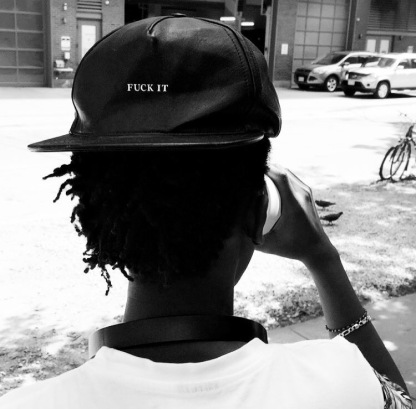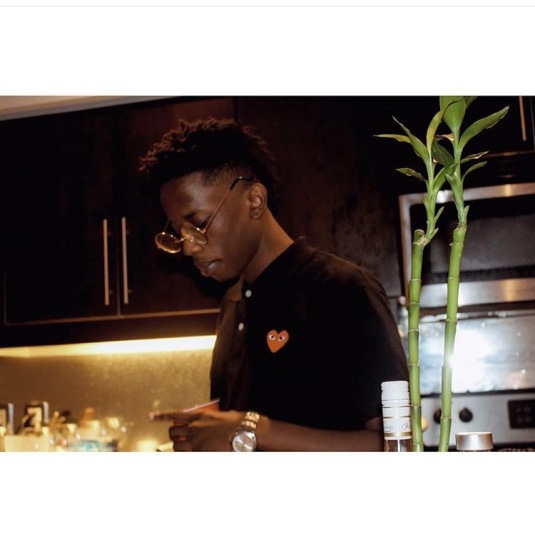I’d never FaceTimed a stranger until I FaceTimed Landry, or Kiga, as you’ll find him in the music world. I have to say it was quite nerve-wracking beforehand—I spent way too much time trying to find a non-backlit spot in my house and fiddling with how I would prop up my phone while recording the interview on my computer. But 15 minutes into the conversation I had slid more comfortably into my backlit pillows and was looking into space while I talked, much like I do with my friends and family. Just like his amazing mixes, Kiga exudes an ease most people only pretend to have. He’s super chill, but behind the vibe is a clear attention to detail and a wonderfully complicated background that greatly influences his music. Kiga, is of Burundian descent, grew up in Ethiopia (where his family still lives) and currently lives in Toronto, where he attended university. While I have my own issues with the term, I have to admit, if there ever was a poster child for the third culture kid, it would be Landry.

“All my life I’ve been an immigrant, I’m never at home. Whatever country I live in, I never have the passport from there, I’m always a foreigner you know? I spend my whole life trying to fit in, so I would just be the guy that everybody wants me to be. When I select music, that’s the only place I can be myself, I’m comfortable with it, and I’m in [control] of what I’m doing.”
From the start of his mixes, this intention is clear. The vibe is set and Landry never deviates, he enhances. He takes risks too, incorporating everything from spoken word, to the obscure, to re-fixes of the popular, to Afrobeats, to nu R&B – all in one mix. And it works.
“I would call myself a curator or selector.”
Terminology is tricky. When I first spoke to Landry, I wanted to call him a DJ. I found him through his mixes and his playlists on Soundcloud, so in my mind, that definitely constitutes “DJ.” But when I asked him, he hesitated, citing a technical threshold he believes he has yet to cross. While I think he’s being humble, there is something to the term curator that better captures his music selection. It’s a craft, a specialized attention to mood and ambience (that’s not always party-party) without succumbing to the winds of popularity. Maybe it’s just me, but I get a little nervous playing obscure music for friends, especially when it’s out of our genre comfort zone—that moment with the aux cord when you have to make a decision between the actual song you’ve been listening to all weekend, or the one you think your friends want to hear can be highly stressful! So when someone can hit you with 30 minutes of straight unfamiliar yet beautiful vibes, that’s curation.
How did you get into music?
Everybody in my family loves music and I feel like everybody has different taste so I was attracted to many different sounds. My dad loves a lot of old South African music. He loves Brenda Fassie, Hugh Masekela and Miriam Makeba. He educated me on Burundian and Rwandese music and reggae too. My sister was into R&B, soul, then she went to hip-hop, and now she loves Afrobeats. My little brother is in love with Congolese music. My little sister is similar to me, she’s in touch with everything. So it started in the house.
I think I was like in 7th grade. In Ethiopia the government provides everything that’s telecom, like phones [and] internet so they were super slow. But because my dad works for the UN we were able to have access to fast internet [so] I would go to his office and download so much music. People started asking me to make CDs that they could play on their drive home or on the way to school and I would sell them once in a while and people really enjoyed them.
When I moved to Toronto, I still had really good taste in music, because I would be the one sending people songs or people would go on my Facebook wall if they wanted to know what’s poppin. So one day a girl at school was like “The African association is having a party and we need a DJ” and I was like ok I can do that, I have a computer and I know how to use the software, so I did it and then I saw the reaction of people and it was so amazing. So a few months later I bought my controller and started practicing and doing gigs here and there and getting better and finding more new songs. I took some classes, watched a lot of Youtube videos. I had a mentor who taught me how to DJ. She’s probably one of the dopest DJs I’ve met skill-wise cause nowadays everybody is a DJ, but she learned on turntables.
Musical influences?
As a curator it’s definitely Joe Kay from Soulection. His Soulection shows opened my ears to the next level. Without him I wouldn’t be that open-minded about sound and I wouldn’t do so much research to find new underground music. I am also influenced by artists like Prince, Jay-Z, Sade, Fela Kuti, William Onyeabor, Boddhi Satva and Mikael Seifu. Black Coffee is probably the DJ that influences me the most, because he stays true to himself, he is authentic and his music is a good representation of his country and the continent of Africa. It’s a fusion of soul, African drums and house music. Plus he is taking the sound worldwide through his tours and inspiring a whole continent with his work.
Has your background, being from Burundi and Ethiopia, affected your creative expression?
Yeah definitely. Burundi is well known for their drummers and the percussion [is] usually what grabs my attention in a song, it’s the heartbeat of the track. [But] I think I’m mostly inspired by Ethiopian music. The Ethio-jazz movement really intrigues me, I really enjoy it. It’s like a blend of Ethiopian instruments with a jazz feel to it. And the guy that created it is an Ethiopian that went to Berklee so he studied music really well, [and] he brought jazz back to Ethiopia.
What’s his name?
In Ethiopia when you’re [older] they call you Ato, so I call him Ato Mulatu (his full name is Mulatu Astatke). He’s a very fascinating person and they way he blended jazz and those Ethiopian instruments is something that’s inspired me. I feel like the way I grew up is pushing me to go farther in my musical selection. It’s just me expressing myself and I don’t have boundaries with that. But any other thing that I’m doing, I’m not comfortable, people might find me weird.
What’s the music scene like in Toronto?
Amazing. I think they have the new sound. Anything that’s urban/dope, it’s in Toronto. In terms of hip-hop and R&B, Toronto has it. I think in the future, Toronto is going to have an impact like Atlanta, or New York back in the day, or LA. Toronto has so much talent and because it’s so multicultural, they have the potential to influence hip-hop culture so much.

Okay, rapid fire, favorite artist from Toronto right now?
Hip-hop? I still think Drake is the best. But of the people coming up, probably Sean Leon.
Singer? Daniel Caesar.
Favorite Drake album?
(Laughs) That’s an easy one, Take Care. I don’t think he’ll ever do better, I don’t think it’s possible.
Remi vs. Nicki? (I had to ask, “Shether” had just come out)
I haven’t heard the song. I don’t like rap beefs.
Song or artist on repeat this weekend?
VSVS by 24hrs
How much time a day do you spend listening to new music?
I spend at least 16hrs a day.
Favorite albums? Top 5?
Reasonable Doubt, The Miseducation of Lauryn Hill, Good Kid M.a.a.d City, My Beautiful Dark Twisted Fantasy, and any Prince Album.
Favorite Afrobeats artist?
Wizkid but Maleek Berry’s album was really good and he’s so detail oriented—he waited so long, he was known in the industry [from around] 2012 as a producer.
So where do you see yourself in the future?
My end goal would be to help artists to executive produce albums because I know how to create [a] certain atmosphere with sounds. Especially with Afrobeats artists, because I feel like their body of work is not that amazing….usually you hear good singles but their albums are not that great… [so] I’d love to help out with African artists.
I would [also] love to be a DJ because I have so many sounds that people don’t know about that they need to know about. I still need to educate people on music. That’s why I want to DJ. I would love to travel around the world and educate and inspire people with sounds that they should know.
I hope to inspire people, especially the youth in Africa, to be creative, to think outside the box and know that it’s okay to be different.
Take some time to educate yourself by checking out Kiga on Soundcloud and Facebook.

Leave a comment